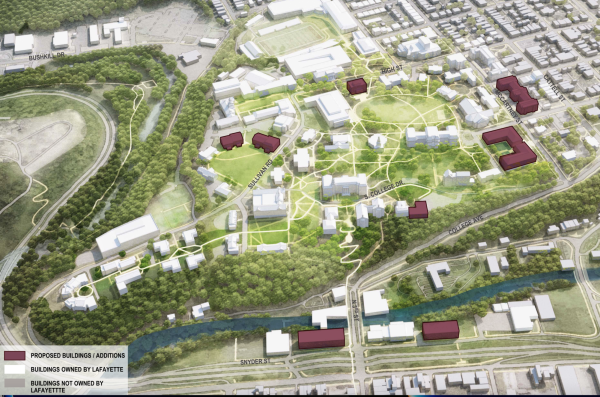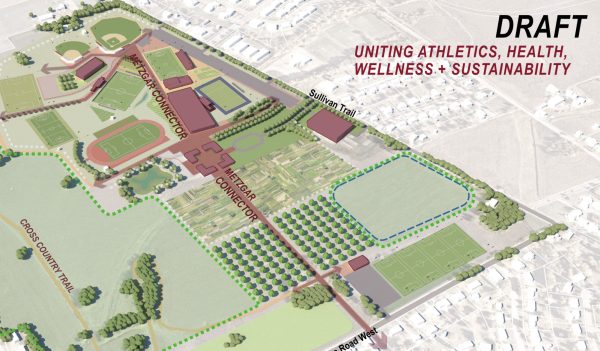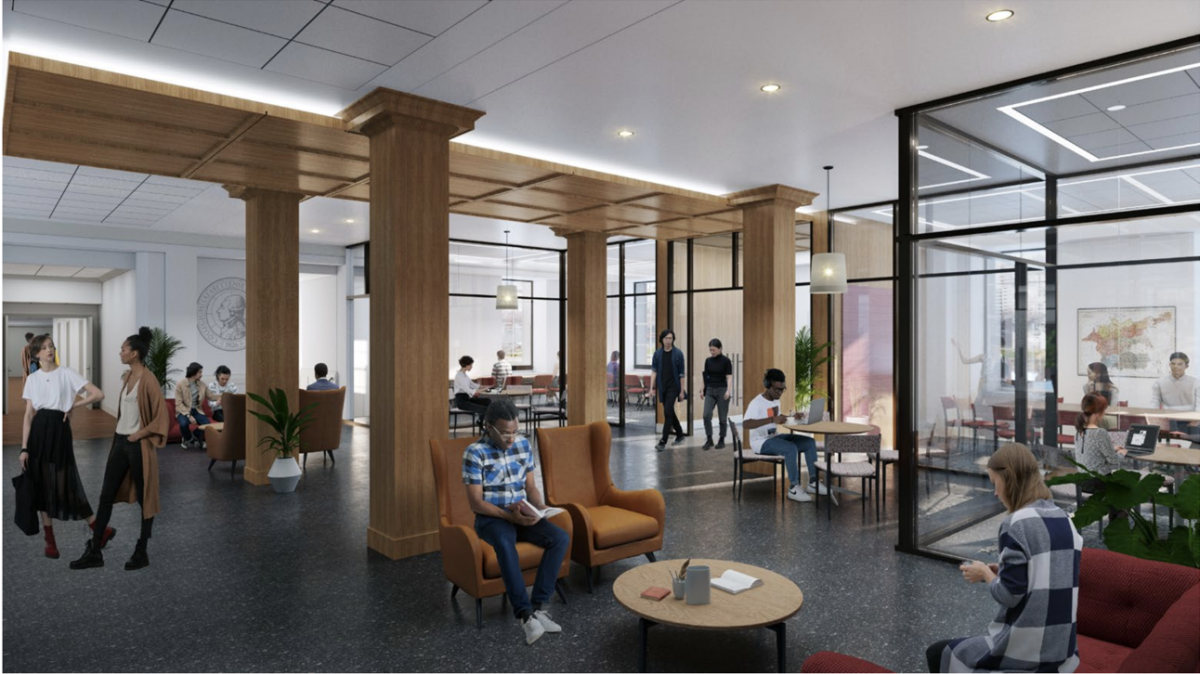Lafayette College revealed a preliminary version of its highly-anticipated master plan earlier this summer, receiving varied reactions from the campus community.
The plan, which was revealed at a June open forum, calls for near-term, mid-term and long-term projects to be completed over the next 15 years. The college partnered with architectural firm SmithGroup to complete the plan.
Developments proposed in the plan are divided into four stages based on expected completion timelines.
Near-term projects, expected to be completed within the next five years, include:
- Renovations to Pardee Hall, Skillman Library 1st Floor and Farinon College Center
- Renovations to Gates, Soles and Watson Hall
- The introduction of movable pop-up dining concepts on the Quad
- The building of a new center for professional development
Mid-term projects, which are projected to be finished within five to 10 years, include:
- A new residence hall and multi-use space in the area that now houses Watson Courts
- An upperclassmen residence hall at the arts campus
- “Phase One” of the Kirby Sports Center renovation
Long-term projects, to be completed within 10 to 15 years, include:
- Renovations to Keefe and McKeen residence halls, as well as the McKelvy House
- “Phase Two” of the Kirby Sports Center renovation
Future projects, which are planned for 15 years or more in the future, include the construction of a new residence hall and an undisclosed “residential/academic opportunity” on March Field.

Pardee Hall’s proposed renovation includes creating more “student-friendly collaboration/study areas,” creating a “visible home for interdisciplinary programs” and introducing “modern classroom technology,” according to the presentation shared at the open forum.
Gabrielle Kelenyi, an assistant professor of English whose office is in Pardee Hall, felt that these developments could be beneficial.
“I think that more streamlined classroom technology would be helpful,” she said.
Kelenyi also said that a renovated Pardee lobby could become a study hub for students, although she questioned how much use it would see compared to other study spaces on campus.
Enrico Bruno, a visiting assistant professor of English whose office is also located in Pardee, had a more neutral reaction.
“It doesn’t strike me as a top priority, but I can see the benefits of it,” Bruno said.
Another near-term project at the college is a new center for professional development, a successor to the career services currently stationed in Hogg Hall. The new center will be “accessible to all,” according to the presentation.
Mike Summers, the associate vice president of Gateway Career Center, declined to comment, deferring all comment to when the master plan is approved.
According to the presentation, the master plan also intends to make the Metzgar Campus an interdisciplinary space. The plans include new athletic facilities, a parking garage, an expansion to LaFarm and the construction of a sustainability center, which incorporates a proposed teaching kitchen and meeting space.

Josh Parr, the college’s manager of food and farm, said that the proposed developments could increase LaFarm’s accessibility to visitors.
“If we want to open more to the community, like when we have the plant sale, having a parking garage that’s pretty close to the farm would be nice,” Parr said. “But, of course, it’s going to need to be located in a place where it’s not going to cast a shadow onto the field.”
Parr did not have concerns about whether the construction at Metzgar would negatively impact LaFarm, saying he does not “foresee any kind of serious contamination or pollution” as a result of the developments.
However, Parr believes expansion is not LaFarm’s main priority.
“It would be awesome to have more space,” Parr said. “But the need we have right now is for more farmers, not more land.”
The master plan is Lafayette’s first in nearly a decade. According to a campus-wide email from college President Nicole Hurd sent on Sept. 6, the next steps for the master plan, including feedback sessions, will be released in the coming weeks.
The plan is on track to be finalized by the end of this semester, with early implementations beginning next year, according to Hurd.
According to the presentation shared at the open forum, SmithGroup and Lafayette engaged in over 30 meetings with stakeholder groups during the planning stages and held open forums with alumni, current students, faculty, staff and Easton community members.
Lauren Leighty, a principal leader with SmithGroup, could not be reached for comment.
“A clear focus of our listening sessions in the campus master plan work was with our Easton community and College Hill neighborhood,” Hurd wrote in an email to The Lafayette. “We had great attendance from our external community members at these sessions, where they provided feedback that in turn was taken into consideration in the campus master plan design.”
Paul Felder, a Lafayette instructor and College Hill resident, acknowledged that while the college and SmithGroup held meetings for community input, he believes they did not adequately address the concerns raised.
Felder drafted the concerns that he believes the Community Impact Committee — a group recently formed by the college meant to address resident concerns — should discuss. Among these concerns are college compliance with local regulations, loss of affordable housing and the threat of absentee landlords.
In 2017, College Hill residents expressed concerns about Lafayette’s expansion into the neighborhood. An account on Facebook, “Save College Hill,” contains many posts that describe city, campus and neighborhood disputes over the last eight years, including a lawsuit in which the college involved itself.
“None of these concerns and suggestions seemed to find their way into Master Plan drafts, and finally, in the summer of 2024, the College acknowledged that the Plan would not address off-campus issues,” Felder wrote in notes to be reviewed by the Community Impact Committee.
Among the notes for the committee include making “suggestions to improve resident/student interactions regarding noise, parking, absentee landlords and maintenance of non-Lafayette owned students housing.”
The committee plans to meet later this month, with the exact date currently unknown.
“The impetus for creation of a Partners/Impact Committee was to consider positive Lafayette/Community activities in the absence of a Master Plan. Since the Master Plan will not address these issues anyway, the need for this Committee continues,” Felder wrote in the meeting notes.
“The campus master plan operates as a guidebook,” Hurd wrote. “As we look to make improvements on campus, we will vet those investments with the campus master plan in hand.”




















































































































